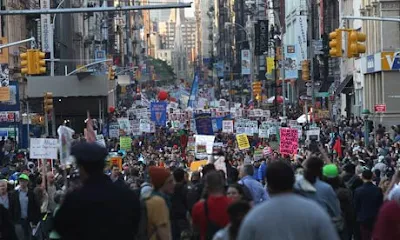I still believe in global warming. Do you?
The latest Rabid Right madness manifested as a billboard showing Ted Kacziynski (The Unabomber) with those words under it, "I still believe in global warming. Do you?" It was sponsored by the increasingly notorious Heartland Institute. It immediately drew more attention than any effort of say 350.org to publicize their Climate Impacts Day of action, which is today (Saturday May 5.)
What is actually newsworthy about this is that a firestorm of criticism--including from GOPers--forced the Institute to take it down. And presumably to scuttle their announced plan to add to the series the faces of Fidel Castro, Charles Manson and Osama bin Laden. I wish I could say this story is from the Onion, but it's from a Bangor, Maine newspaper.
But good marketing ideas never die. I'm starting my own series right here, with the image above.
Meanwhile, NASA has been studying the changes in Arctic ice: "And it now appears that changes in Arctic sea ice affect everything from weather in Europe to the amount of sunlight the Earth absorbs. "The once seemingly insignificant and remote Arctic region is now understood to be intimately connected to the rest of the planet," noted Goddard Space Flight Center's Nathan Kurtz in a post from the field in late March."
A study of Greenland ice says that while melting is not at a worst-case-scenario speed, it has speeded up to a faster rate than UN projections from 2008, and threatens the world's coastal cities with a 3 ft. rise (together with other factors) by the end of the century. “’Glacial pace’ is not slow anymore,” said study author Twila Moon, a glacier researcher at the University of Washington.
As for Connect the Dots day, I wish I could say that I even understand what they're doing, but I am clearly not their demographic. Best of luck to them anyway. For the record, here is what Bill McKibben says is happening:
"We desperately need to put real human faces on climate change — to make sure
that people understand it’s not an abstraction and a future threat, but a very
present and very real crisis. And a crisis with solutions — in many places
people are putting up green dots of hope, at their solar panels and windmills.
(At my mom’s retirement home the residents are heading out to dig a big new
community garden!)
So please: if you can spare an hour or two for the planet on 5/5, make sure
you go to
climatedots.org to find out where the nearest action is, and make sure you
call a few friends and get them to come with you. We won’t solve climate change
in a single day — but if we don’t manage to show our fellow citizens that it’s a
problem, we’ll never solve it.
And here’s the thing — you’ll have a good time. On too many occasions we ask
you to do really hard things, like get arrested. This action is crucial but
simple — just lend your body for a little while to make the most important point
we can make right now.
We’re asking everyone, at every local event, to take a photo of their
“climate dot” and upload it to our website — and we’ll assemble those images
into a global mosaic that puts a real human face on climate change. Our
crew at 350.org will do everything we can to deliver your photos and stories to
the media and decision-makers the world over. We can't let our elected officials
pretend that this crisis is still in the future, and we’ll make sure our actions
on 5/5 are a crucial first step to get global leaders to connect the dots on
climate change."
Is the Story of Sports the Story of Injuries?
-
A lot has happened to the teams I follow in just a few weeks. The
Pittsburgh Steelers were ignominiously defeated by the Houston Oilers in
their wild ca...
16 hours ago

















